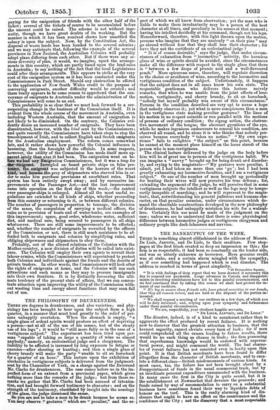THE PHILOSOPHY OF DRUNKENNESS.
Timex are degrees in drunkenness, and also varieties ; and phy- siology has been brought to bear upon the subject from a high quarter, in a manner that must tend greatly to the relief of per- sons unhappily overtaken. When the stomach is empty, "a single glass of ardent spirits would produce an effect of depriving a person—not at all of the use of his senses, but of the steady. use of his legs " ; it would be "still more fully so in the ease of a vertiginous subject." The experiment has been tried upon per- sons "capable of taking as large a quantity of wine as almost anybody," namely, an ecclesiastical judge and a clergyman. The liability to be affected is increased by long exposure to fatigue or exercise—after shooting or hunting; and then a single glass of cherry brandy will make the party "unable to sit on horseback for a quarter of an hour." This lecture upon the exhibition of alcoholics in vertiginoue subjects is delivered from the judgment- seat by the Chancellor of York, on a charge against the Reverend Mr. Clarke for drunkenness. The case comes before us in the im- perfect form of an extract from a provincial paper, which gives nothing more than the remarks of the judge ; but from these re- marks we gather that Mr. Clarke had been accused of intoxica- tion, and had brought forward testimony to character ; and on the strength of the testimony, elucidated by insight into the nosology of the glass, the judge dismissed the cause.
So you are not to take a man to be drunk because he seems so. You may observe " gestures " which are " peculiar," and the as-
poet of which we all know from observation; yet the man who is liable to make them involuntarily may be a person of the best character at all times, and peculiarly in his senses at that moment; having his intellect decidedly at his command, though not his legs. Henceforward, therefore, with this light thrown upon the matter, persons who imagine that they are unsteady " on their pins" may go abroad without fear that they shall lose their character ; for have they not the certificate of an ecclesiastical judge ? "It is of course desirable," says the judge that under circum- stances of exhaustion from "locomotive" activity, the harmless glass of wine or spirits should be avoided, since the circumstances make all the difference with respect to the single glass that there is " between a few drops of prussic acid and a well-flavoured peach." Mere epicurean sense, therefore, will regulate discretion in the choice or avoidance of wine, according to the locomotive and vertiginous condition of the subject. Unfortunately, it happens that the subject does not in all oases know his own state. The respectable gentleman who delivers this lecture naïvely remarks, that when he was unable from the joint effects of loco- motion, vertiginosity, and cherry brandy, to sit on horseback, "nobody but myself probably was aware of this circumstance.", Persons in the condition described are very apt to nurse a hope that nobody observes it; yet what is more conspicuous than a man in the vertiginous state making peculiar gestures? The lines of his motion in no respect coincide or run parallel with the motions of persons of ordinary condition ; the zigzag action, the obstruc- tive movement of the tongue, the aberrant gyrations of the eye, while he makes ingenious endeavours to conceal his condition, are observed all round, and he alone it is who thinks that nobody per- ceives because everybody "takes no notice." "My own expe- rience " fails to enlighten "the subject" on this point, because he cannot at the moment place himself on the locus standi of the person who is non-vertiginous.
The clinical lecture delivered by the judge on the body before him will be of great use to persons of the vertiginous habit. We can imagine a " navvy " brought up for being drunk sad disorder- ly, and crying to the magistrate—" My gestures were peculiar, I admit, yet I had taken no more than one ' go ' ; but I had been greatly exhausting my locomotive faculties, and I am a vertiginous subject." Or one of the number of men brought up periodically for beating their wives will now perceive his true defence ; for, extending the argument of the judge, he will perceive that in some vertiginous subjects the intellect as well as the legs may be tempo- rarily incapable of marching ; and he will represent to the magis- trate, that, notwithstanding his general judicious and humane cha- racter, on that peculiar occasion, under circumstances which de- mand charitable constructions developed in the new philosophy of drunkenness, he had unhappily mistaken his wife for a walnut- tree. Certainly this use must be made of the judgment on the case; unless we are to understand that there is some physiological difference between locomotive judges or vertiginous clergymen and ordinary people like dock-labourers and 'navvies.


























 Previous page
Previous page